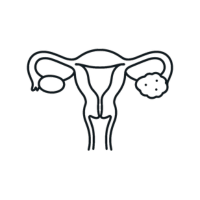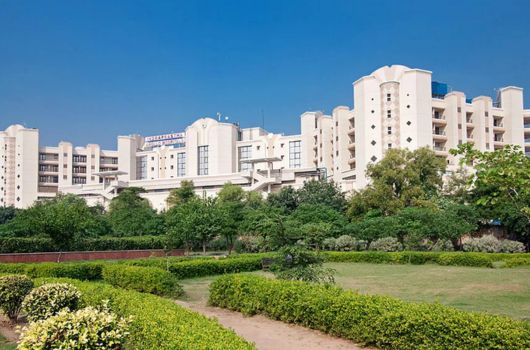
ডিম্বাশয়ের সিস্ট হলো একটি তরলভর্তি থলি, যা ডিম্বাশয়ের উপর বা ভিতরে গঠিত হয়। এই ধরনের সিস্ট নারীদের প্রজনন ক্ষমতার সময়কালেই বেশি দেখা যায় এবং বেশিরভাগ ক্ষেত্রেই তা ক্ষতিকর নয়। অধিকাংশ ডিম্বাশয়ের সিস্টকে 'কার্যকরী সিস্ট' বলা হয়, যেগুলো মাসিক চক্রের সময় স্বাভাবিকভাবেই তৈরি হয় এবং প্রায়ই কোনো চিকিৎসা ছাড়াই অদৃশ্য হয়ে যায়। তবে কিছু সিস্ট বড় হয়ে যেতে পারে, উপসর্গ তৈরি করতে পারে অথবা এমন কোনো অন্তর্নিহিত সমস্যার ইঙ্গিত দিতে পারে যার জন্য চিকিৎসা প্রয়োজন।
অনেক নারীই ডিম্বাশয়ের সিস্ট ক্যান্সারজনিত হতে পারে বলে উদ্বিগ্ন হন, তবে অধিকাংশ সিস্টই অ-ক্যান্সারজনিত এবং ক্ষতিকর নয়। এটাও জানা গুরুত্বপূর্ণ যে ডিম্বাশয়ের সিস্ট ও বার্থোলিন সিস্ট এক নয়। প্রাথমিক পর্যায়ে ডিম্বাশয়ের সিস্ট সাধারণত কোনো উপসর্গ সৃষ্টি করে না। তবে বড় আকারের সিস্ট তলপেটে ব্যথা, ফোলাভাব, অনিয়মিত ঋতুচক্র কিংবা সহবাসের সময় অস্বস্তির মতো উপসর্গ তৈরি করতে পারে। এই লক্ষণগুলো সম্পর্কে সচেতনতা জরুরি, বিশেষ করে যাদের পরিবারে ডিম্বাশয়জনিত সমস্যা বা হরমোনের ভারসাম্যহীনতার ইতিহাস রয়েছে।
একটি সাধারণ ভুল ধারণা হল যে শুধুমাত্র বয়স্ক মহিলাদের সিস্ট বা স্ত্রীরোগ সংক্রান্ত সমস্যা দেখা দেয়। অল্পবয়সী মহিলারাও ডিম্বাশয়ের সিস্ট বা জরায়ু প্রল্যাপসের মতো সম্পর্কিত সমস্যাগুলি অনুভব করতে পারে।
ডিম্বাশয়ের সিস্টের লক্ষণ, ঝুঁকির কারণ এবং শনাক্তকরণ পদ্ধতি জানা মহিলাদের সঠিক সময়ে চিকিৎসা সেবা পেতে সাহায্য করে। রুটিন পেলভিক পরীক্ষা এবং আল্ট্রাসাউন্ডের মতো ইমেজিং পরীক্ষার মাধ্যমে, ডাক্তাররা সিস্টগুলি নিরীক্ষণ করতে পারেন এবং চিকিৎসার প্রয়োজন কিনা তা নির্ধারণ করতে পারেন। প্রাথমিক রোগ নির্ণয় ভাল ফলাফল এবং মানসিক শান্তি নিশ্চিত করে।
বার্থোলিনের সিস্ট তৈরি হয় যখন যোনিপথের কাছে অবস্থিত বার্থোলিন গ্রন্থির নালীটি ব্লক হয়ে যায়, যার ফলে তরল তৈরি হয়। এটি প্রায়শই একটি ব্যথাহীন পিণ্ড হিসাবে প্রদর্শিত হয়, কিন্তু যদি এটি সংক্রামিত হয় তবে এটি একটি ফোড়াতে পরিণত হতে পারে, যার ফলে বসে বা হাঁটার সময় ফোলা, ব্যথা এবং অস্বস্তি হতে পারে। যদিও ছোট সিস্টগুলি নিজেরাই চলে যেতে পারে, বড় বা বেদনাদায়কগুলির জন্য নিষ্কাশন বা ছোট অস্ত্রোপচারের প্রয়োজন হতে পারে। প্রাথমিক চিকিৎসা জটিলতা এবং পুনরাবৃত্তি সংক্রমণ প্রতিরোধ করতে সাহায্য করে।
জরায়ু প্রোল্যাপস তখন ঘটে যখন জরায়ু তার স্বাভাবিক অবস্থান থেকে পিছলে যায় এবং যোনিপথের ভেতরে বা এমনকি বাইরেও চাপ দেয়। এটি পেলভিক ফ্লোর পেশী এবং লিগামেন্ট দুর্বল হওয়ার কারণে ঘটে, যা আর জরায়ুকে সঠিকভাবে সমর্থন করতে পারে না। এটি একটি সাধারণ অবস্থা, বিশেষ করে যেসব মহিলারা যোনিপথে সন্তান প্রসব করেছেন বা মেনোপজের মধ্য দিয়ে গেছেন তাদের ক্ষেত্রে।
কেন জরায়ু প্রল্যাপস হয়?' বোঝার জন্য প্রসবের সময় আঘাত, বার্ধক্য, স্থূলতা, দীর্ঘস্থায়ী কাশি এবং বারবার ভারী জিনিস তোলার মতো সাধারণ ঝুঁকির কারণগুলি বিবেচনা করা প্রয়োজন । এই সমস্যাগুলি পেলভিক পেশী এবং লিগামেন্টগুলিকে দুর্বল করে দিতে পারে , যার ফলে জরায়ু ঝুলে পড়ে বা তার স্বাভাবিক অবস্থান থেকে সরে যায়।
লক্ষণগুলি উপশম করতে , জটিলতা প্রতিরোধ করতে এবং ডিম্বাশয়ের ক্যান্সারের মতো গুরুতর অবস্থা বাদ দেওয়ার জন্য মানুষের ডিম্বাশয়ের সিস্টের চিকিৎসা প্রয়োজন। যদিও অনেক সিস্ট নিজে থেকেই চলে যায়, কিছু বড় হয়ে যায়, বেদনাদায়ক হয়ে ওঠে, অথবা ফেটে যাওয়া বা মোচড়ানোর (ডিম্বাশয়ের টর্শন) মতো সমস্যা সৃষ্টি করে। সময়মত চিকিৎসা অস্বস্তি নিয়ন্ত্রণ করতে, উর্বরতা রক্ষা করতে এবং দীর্ঘমেয়াদী সমস্যা প্রতিরোধ করতে সহায়তা করে।
কিছু ক্ষেত্রে, চিকিৎসা না করা সিস্টের কারণে জরুরি অবস্থা দেখা দিতে পারে যার জন্য তাৎক্ষণিক অস্ত্রোপচারের প্রয়োজন হয়। গর্ভধারণের চেষ্টা করছেন এমন মহিলাদের জন্য বা হরমোনের ভারসাম্যহীনতা রয়েছে এমন মহিলাদের জন্য, ডিম্বাশয়ের সিস্টের চিকিৎসা প্রজনন স্বাস্থ্যের জন্যও গুরুত্বপূর্ণ।
ডিম্বাশয়ের সিস্ট বিভিন্ন কারণে তৈরি হয়, প্রায়শই হরমোনের পরিবর্তন বা অন্তর্নিহিত স্বাস্থ্যগত অবস্থার সাথে যুক্ত। বেশিরভাগ সিস্টই সৌম্য এবং মাসিক চক্রের সময় তৈরি হয়, তবে অন্যান্য ধরণের সিস্টের জন্য চিকিৎসার প্রয়োজন হতে পারে। সাধারণ কারণগুলির মধ্যে রয়েছেঃ
বেশিরভাগ ডিম্বাশয়ের সিস্টের কোনও লক্ষণ থাকে না, বিশেষ করে যদি সেগুলি ছোট হয়। তবে, যখন লক্ষণগুলি দেখা দেয়, তখন এর মধ্যে অন্তর্ভুক্ত থাকতে পারেঃ
যদিও বেশিরভাগ ডিম্বাশয়ের সিস্ট নিজে থেকেই ঠিক হয়ে যায়, কিছু ঘরোয়া প্রতিকার অস্বস্তি কমাতে এবং হরমোনের ভারসাম্য বজায় রাখতে সাহায্য করতে পারে। যেকোনো প্রতিকার চেষ্টা করার আগে সর্বদা একজন ডাক্তারের সাথে পরামর্শ করুন, বিশেষ করে যদি আপনার ব্যথা হয় বা সিস্টটি বেড়ে যায়।
১. উষ্ণ কম্প্রেস বা হিটিং প্যাড
২. ইপসম সল্ট বাথ
৩. আদা চা
৪. আপেল সিডার ভিনেগার (ACV)
৫. তিসির বীজ
৬. ক্যাস্টর অয়েল প্যাক
৭. স্বাস্থ্যকর খাদ্যাভ্যাস
৮. সক্রিয় থাকুন
এই লক্ষণগুলি তখনই চিকিৎসার দিকে পরিচালিত করে যখন পরীক্ষাগুলি ডিম্বাশয়ের সিস্টের উপস্থিতি নিশ্চিত করে যা বড়, বেদনাদায়ক, অথবা স্থায়ী। যদি সিস্টটি টর্শন বা ফেটে যাওয়ার মতো জটিলতা সৃষ্টি করে, অথবা ক্যান্সারের ঝুঁকি সম্পর্কে উদ্বেগ থাকে তবেও চিকিৎসার প্রয়োজন । এমনকি যদি লক্ষণগুলি অব্যাহত থাকে বা মহিলার ডিম্বাশয়ের সমস্যার ইতিহাস থাকে তবে ছোট সিস্টগুলিরও পর্যবেক্ষণের প্রয়োজন হতে পারে।
ডিম্বাশয়ের সিস্ট প্রাথমিকভাবে সনাক্ত করা জটিলতা প্রতিরোধ করতে সাহায্য করে। যদি কোনও ডাক্তার লক্ষণ বা পেলভিক পরীক্ষার উপর ভিত্তি করে সিস্ট সন্দেহ করেন, তাহলে তারা নিম্নলিখিত পরীক্ষাগুলির পরামর্শ দিতে পারেনঃ
যদি আপনি কয়েক সপ্তাহের বেশি সময় ধরে এই লক্ষণগুলির কোনওটি অনুভব করেন, তাহলে চিকিৎসকের পরামর্শ নেওয়া গুরুত্বপূর্ণ। যদিও অনেক ডিম্বাশয়ের সিস্ট ক্ষতিকারক নয়, প্রাথমিক রোগ নির্ণয় জটিলতা প্রতিরোধ করতে সাহায্য করে এবং সঠিক চিকিৎসা নিশ্চিত করে। যদি আপনি বা আপনার প্রিয়জনরা লক্ষণগুলির সম্মুখীন হন বা ডিম্বাশয়ের স্বাস্থ্য নিয়ে উদ্বেগ প্রকাশ করেন, তাহলে বাংলা হেলথ্ কানেক্ট আপনাকে অ্যাপোলো হাসপাতালের বিশেষজ্ঞদের সাথে সংযুক্ত করবে।
.png)
বাংলাদেশী মহিলাদের মধ্যে ওভারিয়ান সিস্ট চিকিৎসার জন্য ভারত একটি শীর্ষ গন্তব্য । প্রতি বছর, অনেক রোগী এখানে নিরাপদ, বিশেষজ্ঞ চিকিৎসার জন্য আসেন যা সাশ্রয়ী এবং কার্যকর উভয়ই।
ভারত দক্ষ ডাক্তার, উন্নত চিকিৎসার বিকল্প, কম খরচ এবং রোগী-বান্ধব পরিষেবার সঠিক মিশ্রণ প্রদান করে । অন্যান্য দেশের তুলনায়, ভারতে রোগীরা অনেক বেশি সাশ্রয়ী মূল্যে একই মানের চিকিৎসা সেবা পান।
ভারতের শীর্ষস্থানীয় হাসপাতালগুলির সাথে যোগাযোগ করতে, ডাক্তারের অ্যাপয়েন্টমেন্ট বুক করতে, অথবা সেকেন্ড অপিনিয়ন পেতে আজই বাংলা হেলথ্ কানেক্টের সাথে যোগাযোগ করুন।
অ্যাপোলো হাসপাতাল ভারতের অন্যতম বিশ্বস্ত স্বাস্থ্যসেবা প্রদানকারী প্রতিষ্ঠান, যার মধ্যে রয়েছে ওভারিয়ান সিস্টের চিকিৎসা। এখানে তাদের কিছু শীর্ষস্থানীয় কেন্দ্রের নাম দেওয়া হলঃ


.jpg)





বিশ্বস্ত এবং ব্যাপক স্বাস্থ্যসেবার জন্য, ভারতের অ্যাপোলো হাসপাতালগুলি উন্নত প্রযুক্তি এবং সকল প্রধান শাখায় অভিজ্ঞ বিশেষজ্ঞদের একটি দল দ্বারা সমর্থিত বিশ্বমানের চিকিৎসা পরিষেবা প্রদান করে । এই হাসপাতালগুলির প্রতিটি রোগ নির্ণয় থেকে শুরু করে অস্ত্রোপচার এবং ফলোআপ পর্যন্ত সম্পূর্ণ যত্ন প্রদান করে। অ্যাপোলো আন্তর্জাতিক রোগীদের জন্য ভাষা, ভ্রমণ এবং থাকার ক্ষেত্রে সহায়তা সহ সহজ চিকিৎসা সেবা প্রদানের জন্যও পরিচিত।
ভারতে ওভারিয়ান সিস্টের চিকিৎসা অন্যান্য অনেক দেশের তুলনায় অত্যন্ত সাশ্রয়ী। গড়ে, ওভারিয়ান সিস্ট সার্জারির খরচ ₹30,000 থেকে ₹2,50,000 (প্রায় $350 থেকে $3,000 ) পর্যন্ত। পশ্চিমা দেশগুলির তুলনায় খরচ উল্লেখযোগ্যভাবে কম, তবে যত্নের উচ্চ মান বজায় রাখা হয়। চিকিৎসা পদ্ধতি, হাসপাতালের অবস্থান এবং সিস্টের ধরণের মতো একাধিক কারণের উপর ভিত্তি করে চূড়ান্ত খরচ পরিবর্তিত হতে পারে । চিকিৎসা-ভিত্তিক খরচের বিস্তারিত সারণী দেখার আগে, এই খরচগুলিকে সবচেয়ে বেশি কী প্রভাবিত করে তা বোঝা সহায়ক।
ভারতে ওভারিয়ান সিস্ট চিকিৎসার মোট খরচকে বেশ কয়েকটি কারণ প্রভাবিত করেঃ
ভারতে ওভারিয়ান সিস্ট চিকিৎসার গড় খরচ নিম্নরূপ;
দ্রষ্টব্য - তালিকাভুক্ত খরচ আনুমানিক এবং হাসপাতাল, অবস্থান এবং রোগীর চাহিদার উপর নির্ভর করে পরিবর্তিত হতে পারে। সঠিক এবং আপডেট তথ্যের জন্য স্বাস্থ্যসেবা প্রদানকারীর সাথে পরামর্শ করুন।
উপরের সারণীতে মুদ্রা রূপান্তর হার ২০২৫ সালের জুন মাসের তথ্যের উপর ভিত্তি করে তৈরি
চিকিৎসার খরচ সম্পর্কে বিস্তারিত তথ্য এবং আরও তথ্যের জন্য, আপনি ভারতের অ্যাপোলো হাসপাতালে চিকিৎসার খরচ জানতে বাংলা হেলথ্ কানেক্টের সাথে যোগাযোগ করতে পারেন ।
ল্যাপারোস্কোপিক সিস্ট এক্সিশনের মাধ্যমে চিকিৎসা করা ডিম্বাশয়ের সিস্টের পুনরাবৃত্তির হার মাত্র ৪%, যা সিস্ট অ্যাসপিরেশনের মাধ্যমে দেখা যায় তার পুনরাবৃত্তির হার বেশি। এর থেকে বোঝা যায় যে এক্সিশন সিস্ট এবং এর সাথে সম্পর্কিত লক্ষণগুলি থেকে দীর্ঘস্থায়ী উপশম প্রদান করে। তাছাড়া, ল্যাপারোস্কোপির সময় সৌম্য-আবির্ভূত সিস্টের ক্ষেত্রে অপ্রত্যাশিতভাবে ডিম্বাশয়ের ক্যান্সার সনাক্ত হওয়ার সম্ভাবনা খুবই কম, ১% এর নিচে।
ডিম্বাশয়ের সিস্টের চিকিৎসায় সাফল্যের অর্থ হল সিস্টটি নিরাপদে অপসারণ বা সমাধান করা হয় , লক্ষণগুলি উপশম হয় এবং রোগী একটি সুস্থ, ব্যথামুক্ত জীবনে ফিরে আসে
অ্যাপোলো হাসপাতাল হাজার হাজার মহিলাকে ডিম্বাশয়ের সিস্ট পরিচালনা এবং সেরে উঠতে সাহায্য করেছে, যার ফলে চমৎকার ফলাফল পাওয়া গেছে। এটি নিম্নলিখিতগুলির জন্য পরিচিতঃ

একটি সচেতনতামূলক অধিবেশনে, চেন্নাইয়ের অ্যাপোলো উইমেন্স হাসপাতালের কনসালট্যান্ট গাইনোকোলজিস্ট এবং ল্যাপারোস্কোপিক এবং রোবোটিক সার্জন ডাঃ মীনাক্ষী সুন্দরম ডিম্বাশয়ের সিস্ট এবং জরায়ু ফাইব্রয়েডের মধ্যে মূল পার্থক্য ব্যাখ্যা করেছিলেন । ডিম্বাশয়ের সিস্ট হল তরল-ভরা থলি যা ডিম্বাশয়ের ভিতরে বা পৃষ্ঠের উপরে বিকশিত হয়, অন্যদিকে জরায়ু ফাইব্রয়েড হল কঠিন, অ-ক্যান্সারযুক্ত বৃদ্ধি যা জরায়ুর পেশী প্রাচীরের মধ্যে তৈরি হয় । এটি উভয়ের মধ্যে প্রাথমিক পার্থক্য। তিনি আরও বলেন যে, যদিও বিরল, কখনও কখনও জরায়ুর কাছে সিস্ট তৈরি হওয়া এবং ডিম্বাশয়ের কাছাকাছি বা তার উপরে ফাইব্রয়েড দেখা দেওয়া সম্ভব।

হায়দ্রাবাদের অ্যাপোলো হাসপাতালের প্রসূতি ও স্ত্রীরোগ বিশেষজ্ঞ ডাঃ রুমা সিনহা ডিম্বাশয়ের সিস্ট সম্পর্কে বেশ কিছু প্রচলিত ধারণার অবসান ঘটিয়েছেন । তিনি ব্যাখ্যা করেছেন যে সমস্ত ডিম্বাশয়ের সিস্ট বন্ধ্যাত্বের কারণ হয় না বা ক্যান্সার সৃষ্টি করে না। বেশিরভাগই সৌম্য এবং উর্বরতার উপর প্রভাব ফেলে না। সার্জারি সবসময় প্রয়োজন হয় না, কারণ অনেক সিস্ট নিজে থেকেই ঠিক হয়ে যায় এবং প্রয়োজনে, খোলা অস্ত্রোপচারের চেয়ে ন্যূনতম আক্রমণাত্মক কৌশলগুলি পছন্দ করা হয়। তিনি স্পষ্ট করে বলেন যে সমস্ত সিস্ট PCOS কারণে হয় না, এবং বেশিরভাগই ব্যথাহীন এবং ঘটনাক্রমে আবিষ্কৃত হয়। গুরুত্বপূর্ণ বিষয় হল, প্রতিটি সিস্ট অপসারণের প্রয়োজন হয় না যদি না এটি লক্ষণ দেখা দেয় বা সন্দেহজনক বৈশিষ্ট্য না দেখায়। ডাঃ সিনহা সিস্টকে উপেক্ষা করার বিরুদ্ধে সতর্ক করেছেন এবংটর্শন বা রক্তপাতের মতো জটিলতা এড়াতে সঠিক চিকিৎসা মূল্যায়ন এবং ফলো-আপের প্রয়োজনীয়তার উপর জোর দিয়েছেন।
অ্যাপোলো হাসপাতাল উন্নত রোগ নির্ণয়, ন্যূনতম আক্রমণাত্মক অস্ত্রোপচার এবং বিশেষজ্ঞ স্ত্রীরোগ বিশেষজ্ঞদের সমন্বয়ে বিশ্বস্ত, অত্যন্ত সফল ওভারিয়ান সিস্টের যত্ন প্রদান করে।
বাংলা হেলথ্ কানেক্ট বাংলাদেশী মহিলাদের ভারতে নিরাপদ, নির্ভুল এবং সময়োপযোগী ওভারিয়ান সিস্ট চিকিৎসা পেতে সাহায্য করে। চিকিৎসা যাত্রার প্রতিটি ধাপ মসৃণ এবং চাপমুক্ত করার জন্য টিমটি অ্যাপোলো হাসপাতালের সাথে ঘনিষ্ঠভাবে কাজ করে।
বাংলা হেলথ্ কানেক্ট এই প্রক্রিয়াটিকে সহজ এবং সহায়ক করে তোলে, ভ্রমণ ব্যবস্থা থেকে শুরু করে চলমান চিকিৎসা নির্দেশনা পর্যন্ত, যাতে বাংলাদেশী রোগীদের মানসিক শান্তির সাথে উচ্চমানের চিকিৎসা সেবা নিশ্চিত করা যায়। ৬০,০০০ এরও বেশি বাংলাদেশী রোগীর সহায়তায়, বাংলা হেলথ্ কানেক্ট স্পষ্টতা, যত্ন এবং ব্যক্তিগত সহায়তার মাধ্যমে দৃঢ় আস্থা তৈরি করেছে
বিশ্বস্ত সহায়তার মাধ্যমে আপনার চিকিৎসা যাত্রা শুরু করতে আজই বাংলা হেলথ্ কানেক্টের সাথে যোগাযোগ করুন ।
দ্রষ্টব্য: বাংলা হেলথ্ কানেক্ট কোনও ধরণের চিকিৎসা পরামর্শ প্রদান করে না।
✅ আপনার রিপোর্ট শেয়ার করুন
✅ অ্যাপোলো হাসপাতাল থেকে চিকিৎসা পরিকল্পনা পান
✅ আপনার জন্য উপযুক্ত একটি বেছে নিন
✅পরবর্তী সব ব্যবস্থাপনা আমাদের উপর ছেড়ে দিন।
ডিম্বাশয়ের সিস্ট হল একটি তরল-ভরা থলি যা ডিম্বাশয়ের উপরে বা ভিতরে বিকশিত হয়। বেশিরভাগ সিস্ট সৌম্য এবং প্রায়শই নিজে থেকেই সেরে যায়, তবে কিছু সিস্ট লক্ষণ দেখা দিতে পারে বা চিকিৎসার প্রয়োজন হতে পারে।
ডিম্বাশয়ের সিস্ট সাধারণত পেলভিক আল্ট্রাসাউন্ড, শারীরিক পরীক্ষা এবং কখনও কখনও রক্ত পরীক্ষার মাধ্যমে সনাক্ত করা হয়। প্রাথমিক সনাক্তকরণ পর্যবেক্ষণ বা চিকিৎসার প্রয়োজন কিনা তা নির্ধারণ করতে সহায়তা করে।
যদি ডিম্বাশয়ের সিস্ট ধরা পড়ে, তাহলে মূল্যায়নের জন্য একজন স্ত্রীরোগ বিশেষজ্ঞের সাথে পরামর্শ করুন। চিকিৎসার বিকল্পগুলি সিস্টের আকার, ধরণ এবং লক্ষণগুলির উপর নির্ভর করে এবং পর্যবেক্ষণ, ওষুধ বা অস্ত্রোপচার অন্তর্ভুক্ত থাকতে পারে।
যদিও সব সিস্ট প্রতিরোধ করা যায় না, হরমোনের ভারসাম্য বজায় রাখা, নিয়মিত স্ত্রীরোগ সংক্রান্ত পরীক্ষা-নিরীক্ষা এবং PCOS মতো পরিস্থিতি পরিচালনা করলে ঝুঁকি কমানো যেতে পারে
চিকিৎসার ধরণ অনুসারে হাসপাতালে থাকার সময়কাল ভিন্ন হয়। অনেক ল্যাপারোস্কোপিক সার্জারিতে ১ থেকে ৩ দিন ভর্তির প্রয়োজন হয়, যার মোট সুস্থতার জন্য প্রায় ১ থেকে ২ সপ্তাহ সময় লাগে।
হ্যাঁ। বাংলা হেলথ্ কানেক্ট ডাক্তারের পরামর্শের সময়সূচী নির্ধারণ থেকে শুরু করে ভিসা সহায়তা, হাসপাতালে ভর্তি, চিকিৎসা সমন্বয় এবং ভ্রমণের ব্যবস্থা পর্যন্ত সম্পূর্ণ সহায়তা প্রদান করে।
হ্যাঁ। তারা স্থানীয় সহায়তা প্রদান করে, যার মধ্যে রয়েছে বিমানবন্দর থেকে পিকআপ, হাসপাতাল নেভিগেশন, দোভাষী পরিষেবা এবং চিকিৎসার অভিজ্ঞতা মসৃণ করার জন্য ফলো-আপ সহায়তা।
হ্যাঁ, বাংলা হেলথ্ কানেক্ট বাংলাদেশি রোগীদের ভারতে চিকিৎসা ভ্রমণের জন্য সম্পূর্ণ ভিসা আবেদন প্রক্রিয়ার মাধ্যমে নির্দেশনা দেয়।

